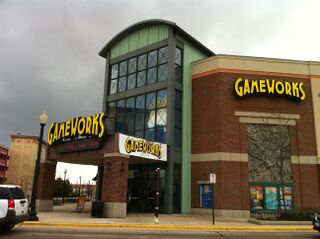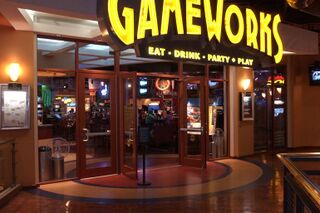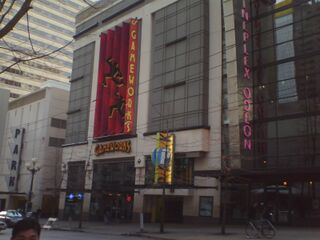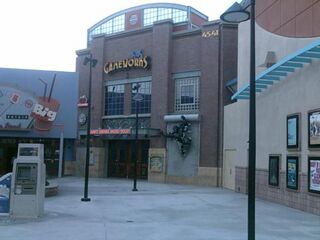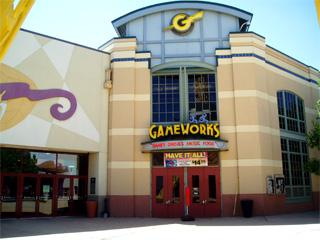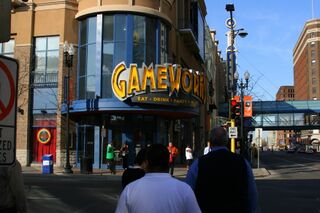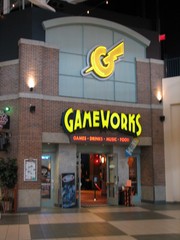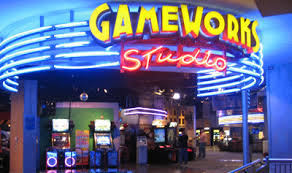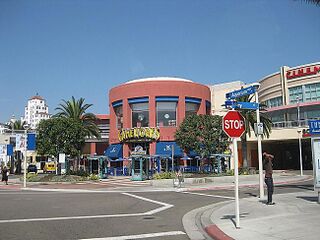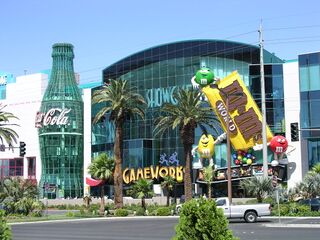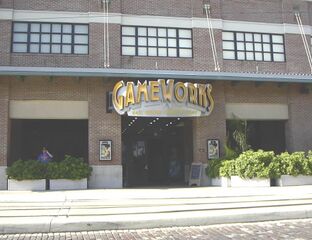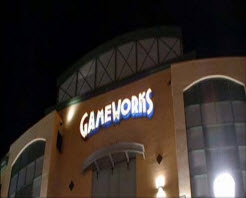Difference between revisions of "GameWorks"
From Sega Retro
| Line 1: | Line 1: | ||
[[File:GameWorks logo.svg|right|300px]]<!-- TODO: {{fileref|Fusion US 0105.pdf|page=16}} --> | [[File:GameWorks logo.svg|right|300px]]<!-- TODO: {{fileref|Fusion US 0105.pdf|page=16}} --> | ||
| − | '''GameWorks''' is a chain of entertainment venues featuring arcade games, simulators | + | '''GameWorks''' is a chain of entertainment venues featuring arcade games, simulators, and full-service bars and restaurants. It was created in 1996 as a joint venture between [[Sega]], Universal Studios, and DreamWorks SKG. GameWorks venues began opening across the United States in 1997, replacing the [[Sega City]] arcades as the United States' modified version of Sega's [[Amusement Theme Park]] concept. |
| − | As of 2011, GameWorks is no longer owned or operated by Sega, with the majority of original venues | + | As of 2011, GameWorks is no longer owned or operated by Sega, with the majority of original venues now permanently closed. |
==Operations== | ==Operations== | ||
| − | GameWorks | + | GameWorks venues are best described as what are now known to the amusement industry as urban entertainment centers, combining arcade games, a small number of [[Mid-size attraction]]s, and full-service food & drink outlets in an urban/inner-city setting. Though many are of a size significantly larger than common amusement arcades, the centers are usually not comparable to the indoor theme parks that Sega created in other countries around the same time - most have not charged admission fees for entrants, or housed [[Large attraction]]s developed by the company, and instead have attempted to cater more to a North American market, where chains like [[wikipedia:Dave &Busters|Dave & Busters]] are popular. |
| − | Like Sega's other indoor amusement venues, [[Sonic the Hedgehog]] was the mascot of GameWorks until | + | Nonetheless, because of their former association with Sega, GameWorks centers were (and still are) home to many of their products and games, as well as examples manufactured by other companies. Games housed in the venues have ranged from older classics to newer simulators, and have included a select number of Mid-size attractions developed by the company, including ''[[The Lost World: Jurassic Park Special]]''. Some locations have also have been used as location test sites for Sega, something likely reflected in ''[[Daytona USA 2: Battle on the Edge]]'' in particular by the inclusion of a large GameWorks logo in one of its racetracks. |
| + | |||
| + | Larger locations would often contain elaborate media and gaming-themed décor, as well as dedicated areas for specific subsets of machines; these were made known to visitors by the inclusion of further theming, including full-size model cars for racing games. Recent years have seen bigger focuses on prize redemption in an attempt to adapt to the larger popularity of them in the current amusement market, as well as newer revisions of its former Play Card payment system, utilising pre-paid rewriteable cards for game credits. | ||
| + | |||
| + | A central part of GameWorks operations that differentiate them from other amusement spaces created by Sega is the inclusion of bars and restaurants, such to the extent that one location, the former Tuscon, Arizona venue, later reopened under Sega as [[World Sports Grille]], placing significant emphasis on its hospitality aspect. Restaurants trading within the centers serve family-friendly food; bars are typically sports bars, with licences to serve alcohol and broadcast sporting events. | ||
| + | |||
| + | Like Sega's other indoor amusement venues, [[Sonic the Hedgehog]] was the mascot of GameWorks until the 2011 sale of the venues, and was featured on the chain's merchandise, redemption prizes, children's menus, party decorations, and as a costumed character. | ||
==History== | ==History== | ||
| − | The first GameWorks was created by Steven Spielberg and opened in Downtown Seattle in March,{{intref|Press release: 1997-03-15: BECK AND COOLIO TO PERFORM AT MTV'S GameWorks PREMIERE PARTY SPECIAL LIVE FROM THE GRAND OPENING OF GameWorks SATURDAY, MARCH 15 IN SEATTLE, WA}} 1997 to much fanfare{{intref|Press release: 1996-12-04: FIRST GameWorks PLAYS IN DOWNTOWN SEATTLE, MARCH 1997}} | + | ===Development=== |
| − | + | ||
| + | ===Launch=== | ||
| + | The first GameWorks was created by Steven Spielberg and opened in Downtown Seattle in March,{{intref|Press release: 1997-03-15: BECK AND COOLIO TO PERFORM AT MTV'S GameWorks PREMIERE PARTY SPECIAL LIVE FROM THE GRAND OPENING OF GameWorks SATURDAY, MARCH 15 IN SEATTLE, WA}} 1997 to much fanfare.{{intref|Press release: 1996-12-04: FIRST GameWorks PLAYS IN DOWNTOWN SEATTLE, MARCH 1997}} A typical facility cost about $10 million or more to build, and plans initially called for up to 150 locations. | ||
| − | Smaller venues which lacked the bar and restaurant aspect of the chain were titled | + | ===Demise=== |
| + | After earnings of the first stores proved disappointing, the scope of the chain was scaled back significantly. Nonetheless, Sega estimated that at its height, the 18 U.S. locations that existed drew in over 15 million guests per year. Smaller venues which lacked the bar and restaurant aspect of the chain were titled [[GameWorks Studios]] and were usually placed in shopping malls. | ||
Due to the costs involved in the venture, DreamWorks SKG withdrew their involvement in 2001, and the chain itself filed for bankruptcy in 2004. NBC Universal's stake in GameWorks was sold to [[Sega Sammy Holdings]] on November 3, 2005, making it wholly-owned by SEGA and was operated by its subsidiary, [[Sega Entertainment USA]] until May 2011. | Due to the costs involved in the venture, DreamWorks SKG withdrew their involvement in 2001, and the chain itself filed for bankruptcy in 2004. NBC Universal's stake in GameWorks was sold to [[Sega Sammy Holdings]] on November 3, 2005, making it wholly-owned by SEGA and was operated by its subsidiary, [[Sega Entertainment USA]] until May 2011. | ||
| − | GameWorks began to struggle financially in the late 2000s as a result of an economic downturn in the United States. As part of a major restructuring move, Sega Entertainment USA suddenly closed down seven GameWorks venues on March 29, 2010, in an attempt to focus the chain's mission on profitability and future growth | + | GameWorks began to further struggle financially in the late 2000s as a result of an economic downturn in the United States. As part of a major restructuring move, Sega Entertainment USA suddenly closed down seven GameWorks venues on March 29, 2010, in an attempt to focus the chain's mission on profitability and future growth. Sega Entertainment USA reported that as a result of the closure, GameWorks employees at the closed locations lost their jobs, although some received 30 days of wages. The ten remaining locations and the [[World Sports Grille]] in Tucson were to become the focus of renewed efforts going forward. |
In May 2011, Sega sold GameWorks, which now consisted of only seven locations, to an investor group headed by theme park and arcade chain veteran Steve Dooner. Now known as Gameworks Entertainment LLC, the company has moved its headquarters from the Chicago suburbs to Las Vegas. Dooner, GameWorks' new chief executive, said he originally tried to buy Gameworks in 2001 and discussed the possibilities of making the acquisition a second time in 2004 before the chain was declared bankrupt. His third and successful round of negotiations with Sega began in January 2010. | In May 2011, Sega sold GameWorks, which now consisted of only seven locations, to an investor group headed by theme park and arcade chain veteran Steve Dooner. Now known as Gameworks Entertainment LLC, the company has moved its headquarters from the Chicago suburbs to Las Vegas. Dooner, GameWorks' new chief executive, said he originally tried to buy Gameworks in 2001 and discussed the possibilities of making the acquisition a second time in 2004 before the chain was declared bankrupt. His third and successful round of negotiations with Sega began in January 2010. | ||
Revision as of 23:05, 1 May 2021
GameWorks is a chain of entertainment venues featuring arcade games, simulators, and full-service bars and restaurants. It was created in 1996 as a joint venture between Sega, Universal Studios, and DreamWorks SKG. GameWorks venues began opening across the United States in 1997, replacing the Sega City arcades as the United States' modified version of Sega's Amusement Theme Park concept.
As of 2011, GameWorks is no longer owned or operated by Sega, with the majority of original venues now permanently closed.
Contents
Operations
GameWorks venues are best described as what are now known to the amusement industry as urban entertainment centers, combining arcade games, a small number of Mid-size attractions, and full-service food & drink outlets in an urban/inner-city setting. Though many are of a size significantly larger than common amusement arcades, the centers are usually not comparable to the indoor theme parks that Sega created in other countries around the same time - most have not charged admission fees for entrants, or housed Large attractions developed by the company, and instead have attempted to cater more to a North American market, where chains like Dave & Busters are popular.
Nonetheless, because of their former association with Sega, GameWorks centers were (and still are) home to many of their products and games, as well as examples manufactured by other companies. Games housed in the venues have ranged from older classics to newer simulators, and have included a select number of Mid-size attractions developed by the company, including The Lost World: Jurassic Park Special. Some locations have also have been used as location test sites for Sega, something likely reflected in Daytona USA 2: Battle on the Edge in particular by the inclusion of a large GameWorks logo in one of its racetracks.
Larger locations would often contain elaborate media and gaming-themed décor, as well as dedicated areas for specific subsets of machines; these were made known to visitors by the inclusion of further theming, including full-size model cars for racing games. Recent years have seen bigger focuses on prize redemption in an attempt to adapt to the larger popularity of them in the current amusement market, as well as newer revisions of its former Play Card payment system, utilising pre-paid rewriteable cards for game credits.
A central part of GameWorks operations that differentiate them from other amusement spaces created by Sega is the inclusion of bars and restaurants, such to the extent that one location, the former Tuscon, Arizona venue, later reopened under Sega as World Sports Grille, placing significant emphasis on its hospitality aspect. Restaurants trading within the centers serve family-friendly food; bars are typically sports bars, with licences to serve alcohol and broadcast sporting events.
Like Sega's other indoor amusement venues, Sonic the Hedgehog was the mascot of GameWorks until the 2011 sale of the venues, and was featured on the chain's merchandise, redemption prizes, children's menus, party decorations, and as a costumed character.
History
Development
Launch
The first GameWorks was created by Steven Spielberg and opened in Downtown Seattle in March,[1] 1997 to much fanfare.[2] A typical facility cost about $10 million or more to build, and plans initially called for up to 150 locations.
Demise
After earnings of the first stores proved disappointing, the scope of the chain was scaled back significantly. Nonetheless, Sega estimated that at its height, the 18 U.S. locations that existed drew in over 15 million guests per year. Smaller venues which lacked the bar and restaurant aspect of the chain were titled GameWorks Studios and were usually placed in shopping malls.
Due to the costs involved in the venture, DreamWorks SKG withdrew their involvement in 2001, and the chain itself filed for bankruptcy in 2004. NBC Universal's stake in GameWorks was sold to Sega Sammy Holdings on November 3, 2005, making it wholly-owned by SEGA and was operated by its subsidiary, Sega Entertainment USA until May 2011.
GameWorks began to further struggle financially in the late 2000s as a result of an economic downturn in the United States. As part of a major restructuring move, Sega Entertainment USA suddenly closed down seven GameWorks venues on March 29, 2010, in an attempt to focus the chain's mission on profitability and future growth. Sega Entertainment USA reported that as a result of the closure, GameWorks employees at the closed locations lost their jobs, although some received 30 days of wages. The ten remaining locations and the World Sports Grille in Tucson were to become the focus of renewed efforts going forward.
In May 2011, Sega sold GameWorks, which now consisted of only seven locations, to an investor group headed by theme park and arcade chain veteran Steve Dooner. Now known as Gameworks Entertainment LLC, the company has moved its headquarters from the Chicago suburbs to Las Vegas. Dooner, GameWorks' new chief executive, said he originally tried to buy Gameworks in 2001 and discussed the possibilities of making the acquisition a second time in 2004 before the chain was declared bankrupt. His third and successful round of negotiations with Sega began in January 2010.
Dooner planned to revitalize GameWorks by making broad changes to technology, menus and marketing, increasing the company's emphasis on social media, and eventually opening new locations. Though the franchise is no longer affiliated with Sega, some theming and redemption prizes are still based off of Sega game franchises. Today, only 6 of the GameWorks locations SEGA opened are still in business.
Locations
(Note: this does not include locations post Sega's 2011 sale)
United States
Schaumburg, Illinois (with The House of the Dead 4 Special, Street Fighter IV arcade machines and new Stern pinball games on test)
Tucson, Arizona (GameWorks Studio) (reopened as World Sports Grille in 2008, also operated by Sega)
International
New York City Center Entertainment Complex[3], Rio de Janeiro, Brazil (Opened November 1999[3]. Despite being a very successful location, constantly full, it was closed due to disagreements with the local representative. They wanted to remove the restaurant, and only keep the 2 bars. The Brazilian company created its own arcade brand, called HotZone.)
Marina Mall, Salmiya, Gulf Street, Kuwait (opened in July 2003)[4]
Locations never built
- Milwaukee, Wisconsin (struck down in the Pabst City project vote)
- Westbury, New York (though a sign outside the Source mall touted its arrival, it never materialized; instead, 'Jillians' took over the location which is now Dave & Busters)
- Harrisburg, Pennsylvania (building built in Harrisburg Mall but the project was abandoned in the wake of the financial crisis of 2007–2010)
External links
References
- ↑ Press release: 1997-03-15: BECK AND COOLIO TO PERFORM AT MTV'S GameWorks PREMIERE PARTY SPECIAL LIVE FROM THE GRAND OPENING OF GameWorks SATURDAY, MARCH 15 IN SEATTLE, WA
- ↑ Press release: 1996-12-04: FIRST GameWorks PLAYS IN DOWNTOWN SEATTLE, MARCH 1997
- ↑ 3.0 3.1 3.2 3.3 http://www.gameworks.com:80/scoop/gw_locations.html (Wayback Machine: 2001-04-09 18:42)
- ↑ http://www.gameworks.com:80/scoop/gw_locations.html (Wayback Machine: 2005-12-14 09:02)

